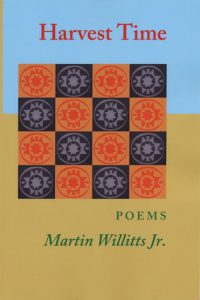Harvest Time
Poems
Martin Willitts Jr.
ISBN:978-1-7343884-7-3
6 x 9; 92 pages; $18.25
Available now
Review of Harvest Time in North of Oxford
About the author
Martin Willitts Jr. is a retired Librarian living in Syracuse, New York.
Some of Martin's awards
He was nominated for 15 Pushcart and 13 Best of the Net awards. Winner of: the 2012 Big River Poetry Review’s William K. Hathaway Award; 2013 Bill Holm Witness Poetry Contest; 2013 “Trees” Poetry Contest; 2014 Broadsided award; 2014 Dylan Thomas International Poetry Contest; Rattle Ekphrastic Challenge, June 2015, Editor’s Choice; Rattle Ekphrastic Challenge, Artist’s Choice, November 2016; Stephen A. DiBiase Poetry Prize, 2018. He won a Central New York Individual Artist Award and provided “Poetry on The Bus” which had 48 poems in local buses including 20 bi-lingual poems from 7 different languages.
Martin Willitts Jr. has 25 chapbooks including the Turtle Island Quarterly Editor’s Choice Award, The Wire Fence Holding Back the World (Flowstone Press, 2017), plus 21 full-length collections including the Blue Light Award 2019, The Temporary World. His recent book is Unfolding Towards Love (Wipf and Stock, 2020).
He is an editor for The Comstock Review, and he is judge for the New York State Fair Poetry Contest. This is his second book with Deerbrook Editions.
Harvest Time is a book of sometimes profound memories
Endorsed by Eve Anthony Hanninen
A voice that gathers in the reader and turns the lines from prose to poetry in an unexpected moment. Those twists are something I’ve tried to encourage in many poets. And Martin Willitts Jr. does them so well. Willitts’ Harvest Time is born of “barn light”—in those moments “when the sun finds its way through wood cracks and dust.” From the outset, peering through such a crack, we readers arrive with Martin, then a boy, at his grandparents’ farm in spring. We watch his world of hard work come alight as boy turns poet with his tongue on fire, even as he must politely sell produce from the roadside stand.
Throughout the book, how simple but evocative the imagery, so carefully chosen, those peach slices in canning jars, and “white lies [mixed in] with the buttermilk,” while readers and poet huddle, shoulder to shoulder in the conspiracy that is storytelling.
On through summer to harvest, Willitts continues to make fires in your imagination with the kindling of his bright, dark, and sometimes profound memories. He places them for you carefully, “each log, each twig.” So, you remain and burn as he builds the framework of a hard life, shiny with blood and wonders. The boy, the man, the poet shows you, in every line, how “survival depends on getting ahead of the hardness.” This is done by marveling in the milkweed and swallowtail explosions that come unbidden, even as you grieve the end of a suffering horse you cannot bear to shoot.
You will find amidst Willitts’ poignant words, his ironies and humor, a deep silence threading throughout — a thread of eternal, unspoken language that stitches together his past with its ever-present insistence that you listen. It’s a language you’ll know; it’s one of “goldenrod opening,” and “a dog’s ear perking.”
—Eve Anthony Hanninen, poet, illustrator, and editor of The Centrifugal Eye: Celebration of Poets
Endorsed by Megan Merchant
Inside this collection are poems of great patience and attention. As Willitts writes, “I fell into earth like seed”—so too does the reader, into a remarkable flow of poems. Each page is an act of deep listening, and an ache of nostalgia that is tethered to simplicity; heirlooms, spinning wool, and horseshoes—bringing to life the sacred, the connection to land and difficult work, love, anger, and questioning. Because time moves at the pace of lessons learned, true wisdom and beauty are able to shine through. Skilled with arrangement, Willitts is able to draw the reader into each poem as an experience, each carefully chosen word on the page like “adding a pinch of salt to make things rise”. The finished product—“a waterfall/ just before a river rushes to leap over”.
—Megan Merchant, author of Grief Flowers

